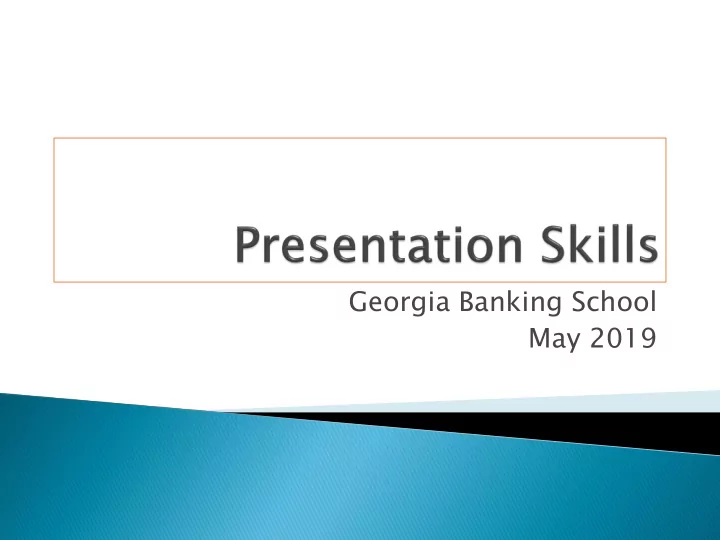

Georgia Banking School May 2019
1. Be able to apply an audience-centered approach to developing a presentation 2. Be able to develop, research, and organize a presentation 3. Gain confidence in presentational speaking and communication skills 4. Get techniques to help people remember your presentation 5. Plan and prepare speeches that inform, persuade, or fulfill the needs of a special occasion
Should always do the following: Get their attention and elicit interest Establish rapport Disclose purpose, your topic, and approach Let them know how they will benefit Get the audience involved in the topic
Ask a rhetorical question. It gets them thinking Begin with a statistic or fact. Use only one statistic. The right facts have a shock value. Begin with a story. It can be yours or someone else’s. Be sure it ties into the topic. Talk about shared experiences. We all have experience that we can relate to. Start with a visual aid. Pictures are powerful.
Start with a definition. Whether it’s Webster’s or your own, it will state in clear terms what you will be discussing. Make reference to the event/group. This opening is great for building rapport with the group. Tell a funny joke. Be sure it relates and offends no one. Start with a quote.
Benefits: ◦ Serves as “cheat sheets” to help you stay on track and remember what to say ◦ Helps your audience understand and retain ◦ Adds interest to your presentation ◦ Makes you look more prepared and professional
Your Body Language: ◦ Attire ◦ Posture ◦ Movement ◦ Gestures ◦ Facial Expressions ◦ Eye Contact
Articulate Vary your delivery Use your voice fast and slow, high and low Pause before and after important ideas Reduce filler words such as “uh” and “um.” Breath with your diaphragm so sentences won’t trail off at the end. Speak with enthusiasm!!
Tips for humor ◦ Be yourself ◦ Have fun ◦ Keep a humor file ◦ Have a message ◦ If in doubt, leave it out ◦ Poke fun at yourself ◦ Practice your delivery
Closing techniques ◦ Summarize your major points ◦ Call the audience to action ◦ Ask a rhetorical question ◦ Refer back to your opening statement ◦ Use a quotation ◦ Use a story or a poem
Know your audience Plan your speech/Prepare Tell Stories Start and finish on time Be yourself Don’t read your slides Avoid overuse of animations Use basic vocabulary Don’t hurry Don’t use too many fonts End your speech with power and impact
Recommend
More recommend